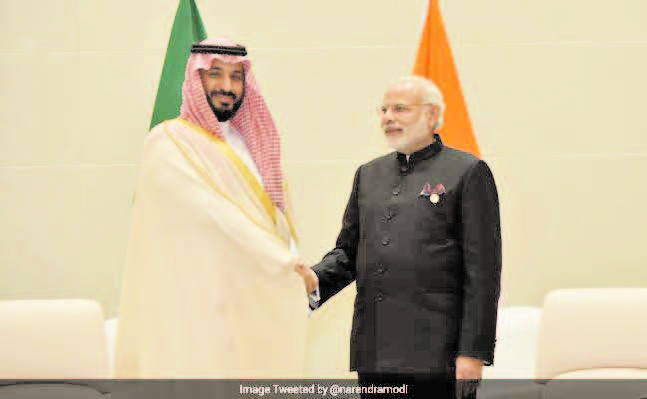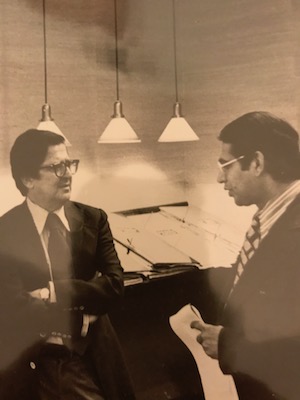
We have risen to the occasion to actively engage oil-rich neighbors to our west, where over six million Indians reside and remit back over $50 billion annually. We can also be proud that we have dexterously maneuvered to avoid being drawn into the sectarian Shia-Sunni, Arab-Persian and other rivalries in the region. PM Narendra Modi has skillfully established an Indian strategic profile with key players in the region by his visits to Saudi Arabia, the UAE and Qatar, while seeking to forge an energy and a connectivity partnership with Iran, based on shared interests in Afghanistan and Central Asia”, says the author – G Parthasarathy.
Swallowing considerations of national pride, after inheriting a bankrupt economy with collapsing exchange reserves forcing India to mortgage its gold in 1991, PM Narasimha Rao undertook a policy of economic liberalization. These measures not only radically changed the contours of domestic economic policies, but also led to closer economic integration with our economically vibrant eastern neighborhood. Quite logically, this new dimension in our foreign policy was labelled as ‘Look East’. In our western neighborhood, we continued with ‘business as usual’. The only significant change was our long overdue establishment of diplomatic relations with Israel.
India is now, a quarter-century later, seizing the opportunities provided by the geopolitical changes that have followed the worldwide discoveries of shale oil and gas. Till barely five years ago, the OPEC cartel of oil producing countries, virtually held us all hostage to their whims and fancy because of their ability to raise oil prices at will. The discovery of huge resources of shale oil and gas, particularly in North and South America, Australia and even in parts of West Asia, has sent global oil prices crashing. It has also given new leverage to large consumers like Japan, China and India to get the oil-producing countries in our immediate western neighborhood, to deal on more mutually beneficial terms, with large neighboring oil and gas consuming countries.
We have risen to the occasion to actively engage oil-rich neighbors to our west, where over six million Indians reside and remit back over $50 billion annually. We can also be proud that we have dexterously maneuvered to avoid being drawn into the sectarian Shia-Sunni, Arab-Persian and other rivalries in the region. PM Narendra Modi has skillfully established an Indian strategic profile with key players in the region by his visits to Saudi Arabia, the UAE and Qatar, while seeking to forge an energy and a connectivity partnership with Iran, based on shared interests in Afghanistan and Central Asia.
Following the American-led military interventions in Iraq and Libya and the suffering inflicted on the hapless people of Syria by meddling from external powers like the US and Russia and regional powers like Turkey, Saudi Arabia, Qatar and Iran, millions of Syrians have fled from their homes. This is a region where national borders drawn at the end of World War I are susceptible to being redrawn. India has avoided getting drawn into these rivalries, from which there will be no real winners, while people suffer misery in countries like Yemen. The Trump administration‘s first military operation in Yemen, undertaken a few days after he assumed office, was a fiasco. Pakistan has undermined relations with its traditional friends like Saudi Arabia and the UAE, by making promises of military assistance and then backing off in Yemen. China has, however, played its cards skillfully by keeping out of sectarian and civilizational rivalries, while securing substantial investment opportunities.
This year began with India hosting the ruler of the UAE, Sheikh Khalifa bin Zayed. PM Modi had earlier visited the UAE, Saudi Arabia, Iran and Qatar. The FDI from the UAE, which is India’s 10th biggest foreign investor, has been increasing. Collectively, the Gulf countries constitute our largest trading partner, accounting for 15 per cent of our global trade. The UAE and Saudi Arabia are individually our third and fourth largest global trading partners. Yet another country, with which we need to cultivate closer ties, is Iraq, whose oil exports to India are rapidly expanding, like exports of Iran after the end of UN sanctions. Iraq, with its immense oil production potential can also become a good investment partner, in the energy sector. We need to look at possibilities of linking oil purchases to investment in Iraq. Naval cooperation is also increasing with the Gulf countries, where proximity gives us some advantages over China. Following the visit of Sheikh Khalifa, the Naval Chief, Admiral Lanba, has scheduled visits to the UAE and Oman
We cannot, however, be sanguine about these developments as we are still perceived as a country which takes an interminably long time in finalizing investment decisions. Iran has always been a difficult partner, when it comes to issues of investment. While we now use the western Iranian Port of Bandar Abbas for the transit of our goods to Afghanistan, Central Asia and Russia, we appear to be facing delays in finalizing the terms of participation in the construction of the Chabahar Port. This project, given Pakistan’s disinclination to give us transit facilities and its propensity to squeeze Afghanistan by delaying transit of its goods, is crucial for both Afghanistan and India. It needs careful follow-up and monitoring at the ministerial level to remove bottlenecks.
The tie-up with Arab monarchies will be reinforced during the proposed visit of the King of Jordan to India. Given our wise decision to delink our relations with Israel and the Palestinians, Jordan could serve as a good connecting point for visits of Indians, to meet leaders of the Palestinian Authority. Moreover, the monarchy in Jordan has continuously maintained a personal rapport with Indian leaders. We also have a moral obligation to stand by our principled position of supporting a two-State solution to the Israel-Palestinian issue, which while guaranteeing Israel’s security, also leads to the establishment of a viable Palestinian State.
India has come a long way from the days in the 1970s, when Saudi Arabia threatened to cut off oil supplies if we did not close down the Israeli Consulate in Mumbai. Not surprisingly, then PM Indira Gandhi flatly rejected the Saudi demand, despite our foreign exchange reserves being precariously low. It is heartening that Mr Modi is undertaking a standalone visit to Israel in coming months. It was shocking how our defense and other ties with Israel were undermined in the recent past by some of our senior ministers seeking to keep a distance from meeting their Israeli counterparts because of narrow, partisan, domestic political considerations. Israel has been a reliable friend of India and has stood by us in times of conflicts, including Kargil. There is no need for us to be apologetic about our relations with the Jewish State, especially at a time, when many of our Arab partners are finding Israel a useful ally, amidst the sectarian and civilizational rivalries and tensions prevalent in the Islamic world.
(The author is an Indian career diplomat)





Be the first to comment